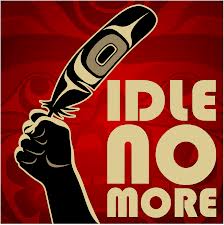Manitoba Métis Win Historic Ruling

“Louis Riel must be smiling.” That’s the front-page headline in the Winnipeg Free Press two days ago.
It’s taken from the response of the head of the Manitoba Métis Federation to the ruling by the Supreme Court of Canada last Friday that the Canadian and Manitoba governments abrogated their responsibilities to respect land rights won by the Métis people when the province was established in 1870. Louis Riel was one of the leaders of the Métis people during the latter half of the 19th century. They are the people of mixed European/Indigenous ancestry in western Canada.
According to the Manitoba Act of 1870, the children of then-Métis residents were to receive some 1.4 million acres of land. That would have given them a head start during the rush for prime agricultural land during the colonial-settler expansion into western Canada that followed the founding of Canada in 1867. Instead, governments delayed or acted dishonorably, effectively disenfranchising the Métis claim.

Background
Louis Riel and fellow governing councilors, Manitoba 1869, Manitoba Archives.(right)
Of the approximate 7,000 Métis children in 1870, 1,000 got nothing and 6,000 received disparate pieces of land. Sooner or later, many lost the land through swindling or coercion. In Canada, they and their descendants became victims of deepgoing national, language and other forms of discrimination.
The Supreme Court ruling does not prescribe a remedy. Indeed, it was not asked to do so by the Métis. They wanted a favourable ruling with which they could then negotiate land and financial settlements. It now behooves the federal and provincial governments to negotiate with the Métis. Time will tell if and how that will occur.
There are considerable economic interests at stake, including projected hydro-electricity lines that Manitoba Hydro wants to construct across disputed land for export markets in the United States.
Most of the land that was supposed to be distributed to the Métis is within or adjacent to present-day Winnipeg. There are an estimated 52,000 people of Métis descent in the province today. Across western Canada, the Métis number several hundred thousand.
This is the second major legal victory for Métis in recent months. In January, the Supreme Court ruled that Ottawa has an obligation to grant constitutional recognition to the estimated 600,000 Métis and “non-status” Indians in the country. The decision opens a door to negotiation or legal action for access to health care, education and other benefits that Ottawa restricts to Aboriginal people with “official” status under the Indian Act (ie to those Aboriginal peoples that signed treaties).
Louis Riel
The Manitoba Act was negotiated by Louis Riel, then head of a provisional government in the Red River Settlement (the land surrounding present-day Winnipeg). That government was formed to resist the unbridled expansion of settlement into western Canada being driven by capitalist interests in the east.
Following the signing of the Act, the personal safety of members of the provisional government, especially of Riel, became precarious. He was obliged to flee several times across the border to the U.S., notwithstanding his popularity and his later election (by acclamation) to the Canadian Parliament in 1873. That election and a second one that produced the same result were annulled by Ottawa.
Riel began a five-year exile from Canada in 1875 under an amnesty agreement by then Prime Minister John A. MacDonald. He served part of it discretely in Quebec and ended up settling in Minnesota in 1878. There he became active in the Republican Party (the party that led the anti-slavery side of the 1861-65 U.S. civil war) and became a naturalized U.S. citizen in 1883.
Riel returned to western Canada in 1884 at the urging of the Métis to assist the second rebellion of Métis, this time in alliance with Aboriginal peoples in the vast territory that later became Saskatchewan and Alberta. The uprising’s principal military commander was Gabriel Dumont. It was defeated by the Canadian military and Riel was captured and executed in Regina, Saskatchewan on November 16, 1885.
Since 2008, Riel is honored each year in Manitoba on Louis Riel Day, a general provincial holiday on the third Monday of February. A statue of him sits on the grounds of the Manitoba Legislature.
In Ottawa, a resolution recognizing Riel as the founder of Manitoba was passed on March 10, 1992. But several legislative initiatives to reverse his 1885 conviction for treason have failed. •
Roger Annis is a writer and antiwar activist in Vancouver, Canada.

